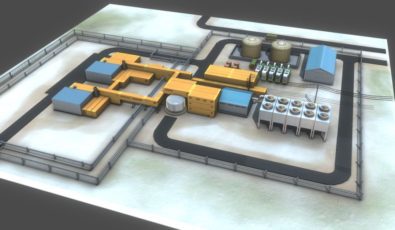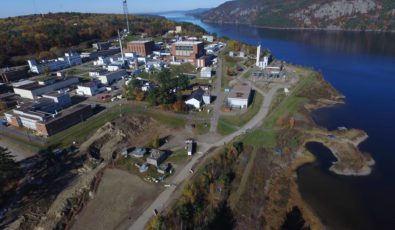OPG marks major milestone in SMR development in Canada
The road to bringing a small modular reactor (SMR) to Canada, the next evolution of nuclear power, marked a major milestone recently as OPG became the first utility in North America to take an ownership stake in an SMR project.

After years of collaboration, Ottawa-based Global First Power (GFP), U.S.-based Ultra Safe Nuclear Corporation (USNC), and OPG announced the formation of the Global First Power Limited Partnership in June. The new partnership will build, own, and operate a proposed Micro Modular Reactor™ (MMR™) at the Chalk River Laboratories site, northwest of Ottawa. This ground-breaking joint venture, equally owned by OPG and USNC, represents the first commercial partnership on an SMR in Canada.
“This is a really big deal as we are now one step closer to seeing an SMR become a reality in Canada,” said Robin Manley, Vice President, New Nuclear Development with OPG. “SMRs will be an important part of Canada’s efforts to combat climate change. They can replace diesel and provide safe, reliable and low-carbon baseload power to remote, off-grid communities, mines and heavy industry.”
The new partnership will see OPG bring its more than 50 years of experience in building, managing and operating nuclear generating stations to help advance the project through the environmental assessment and licensing stages. USNC will be the designer and supplier of the technology. In addition to committing funds, OPG and USNC will be providing their own staff and other necessary resources to GFP, which will be overseeing the project.
“This is a really big deal as we are now one step closer to seeing an SMR become a reality in Canada. SMRs will be an important part of Canada’s efforts to combat climate change.”Robin Manley, Vice President, New Nuclear Development with OPG
With a footprint spanning about the size of a soccer field – significantly smaller than a traditional nuclear station – the proposed MMR will be capable of producing 15 megawatts (MW) of thermal output, or about five MW of electrical power. As a commercial demonstration reactor, the MMR will serve as a model for future deployment opportunities where the low-carbon and versatile power from an SMR could support the energy needs of remote communities and heavy industry. Once in service, the reactor is anticipated to have a lifespan of about 20 years of operation on just a single load of fuel.
“We want to demonstrate the technical side of SMRs but also make the business case that this is an economically viable solution to help achieve Canada’s climate change goals,” Manley said. “Through this project, we will demonstrate SMRs are a cost-effective option given their efficient construction process. This demonstration reactor will be a springboard to enable future SMR projects that could fill specific needs in Ontario and across Canada.”

Requiring minimal operations and maintenance staff to run, USNC’s proprietary high temperature gas reactor will provide clean power that is scalable, adaptable, flexible, and safe. It will be built in a factory and transported to where the power is needed.
Like all nuclear reactors, the USNC design uses a fission reaction to generate heat, but there are some key differences. Unlike current nuclear stations, this design requires no external power or water to operate and cool the reactor. As well, the USNC reactor uses a unique ceramic, micro-encapsulated fuel pellet, molten salt heat transport loop, and helium gas to cool the reactor. The design includes next generation passive safety features, including automatic shut down of the reactor requiring no human interaction in the unlikely event of an emergency.
The joint partnership is just the latest in a series of firsts established by the Chalk River MMR project, which began in 2018 with a proposal submitted to Canadian Nuclear Laboratories (CNL), manager and operator of Atomic Energy of Canada Limited’s (AECL) Chalk River Laboratories. In 2019, GFP became the first SMR project to file for regulatory approval with the Canadian Nuclear Safety Commission (CNSC) and the first to commence an environmental assessment, which is currently underway.
The project is in the planning stage, which will include the development of a detailed project schedule. A number of key decisions and approvals are yet to come, including approval by CNL and AECL to host the SMR project on their site, successful completion and acceptance of the environmental assessment, and receiving the necessary licences from the CNSC.
In parallel to the GFP project, CNL continues to evaluate three other companies also vying to build their own SMR design on the Chalk River site. GFP’s project is the furthest along, now in the third stage of CNL’s four-stage approval process, and a decision on allowing their proposal to proceed is expected to come from CNL sometime this year.
A half-century ago, the storied Chalk River research facility helped develop the CANDU reactor design integral to Canada’s modern nuclear operations and was home to Canada’s first nuclear power plant, the Nuclear Power Demonstration facility.
“We see great value in deploying Canada’s first SMR at the Chalk River Laboratories site given the rich history and wealth of experience and expertise of the CNL staff,” Manley said. “People would come from all over the world to see how SMRs work; we hope Global First Power’s project will be the first they see.”
Small but mighty
Learn about the technology that's the next evolution in nuclear energy.
Subscribe and stay informed
Sign up to receive the latest news, project updates, and event information from OPG.


